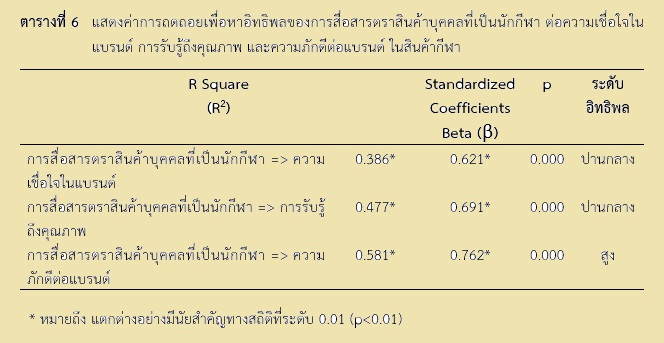THE EFFECTS OF ATHLETE PERSONAL BRANDING ON BRAND TRUST, PERCEIVED QUALITY, AND BRAND LOYALTY IN SPORTS PRODUCT
Main Article Content
Abstract
Background: Nowadays sports brands are highly competitive in the market. Therefore, the concept of athlete personal branding is used to build brand trust, perceived quality, and brand loyalty. However, there is no previous research about the effect of athlete personal branding on brand trust, perceived quality, and brand loyalty in sports product.
Objective: The purpose of this research was to examine the effect of athlete personal branding on brand trust, perceived quality, and brand loyalty in sports product.
Method: This study was quantitative research by using online survey questionnaire to ask a sample of 400 respondents who well recognize both sports brand and athlete presenter’s brand. To measure the constructs, we modified survey questionnaire from previously developed scales. The resulting 32-item questionnaire consisted of four main components: athlete personal branding, brand trust, perceived quality, and brand loyalty. Our study conducted correlation and regression by using SPSS 24.0.
Results: The athlete personal branding would predict the brand trust at 38.6 (R2=0.386), perceived quality at 47.7 (R2=0.477), and brand loyalty at 58.1 (R2=0.581). The influence of athlete personal branding on brand trust was 0.621 (β=0.621), perceived quality was 0.691 (β=0.691), and brand loyalty was 0.762 (β=0.762). The effect of athlete personal branding on brand trust, perceived quality, and brand loyalty were statistically significant in the expected direction (p<0.01), with moderate levels of factor loading.
Conclusion: The athlete personal branding increases brand trust, perceived quality, and brand loyalty in sports product. Our findings on athlete personal branding appear to be advantage for managers to perform marketing public relations strategies and to increase their revenues and profits.
Article Details

This work is licensed under a Creative Commons Attribution-NonCommercial-NoDerivatives 4.0 International License.
References
Amatyakul, S., Mongkolamnuay, W., & Polyorat, K. (2019). Brand communication of Vatanika through “this is me Vatanika” program: Sociological and marketing analyses. Khon Kaen University Journal of Business Administration and Accountancy, 3(1), 49-72.
Arai, A., Ko, Y. J., & Ross, S. (2014). Branding athletes: Exploration and conceptual-ization of athlete brand image. Sport Management Review, 17(2), 97-106.
Audi, M., Marzi, R. A., & Ghazzawi K. (2015). The effect of celebrity endorsement on creating brand loyalty: An application on the lebanese cosmetic sector’s demand. International Journal of Business Management and Economic Research, 6(5), 273-287.
Carlson, D. B., & Donavan, D. T. (2013). Human brands in sport: Athlete brand personality and identification. Journal of Sport Management, 27(3), 193–206.
Chang, Y., Ko, Y. J., & Carlson, B.D. (2018). Implicit and explicit affective evaluations of athlete brands: The associative evaluation-emotional appraisal-intention model of athlete endorsements. Journal of Sport Management, 32(6), 497-510.
Department of Business Development (2019). Business analysis report (Report No. November 2019).
Kim, S., Choe, J. Y., & Petrick, J. F. (2018). The effect of celebrity on brand awareness, perceived quality, brand image, brand loyalty, and destination attachment to a literary festival. Journal of Destination Marketing and Management, 9, 320-329.
McCracken, G. (1989). Who is the Celebrity Endorser? Cultural Foundations of the Endorsement Process. Journal of Consumer Research, 16(3), 310-321.
Su, Y., Baker, B., Doyle, J. P., & Kunkel, T. (2020). The rise of an athlete brand: Factors influencing the social media following of athletes. Sport Marketing Quarterly, 29(1), 33-46.
Takaya, R. (2017). The effect of celebrity endorsement on brand image and trust brand and it’s impact to purchase intention case study: OPPO smart phone. Business and Entrepreneurial Review, 17(2), 183-196.
Thomson, M. (2006). Human brands: Investigating antecedents to consumers’ strong attachments to celebrities. Journal of Marketing, 70(3), 104–119.
Whitehead, M., & Byrne, A. (2003). The naked truth of celebrity endorsement. British Food Journal, 105(4), 288-296.
Yamane, T. (1973). Statistics: An introductory analysis. John Wiley and Sons.


